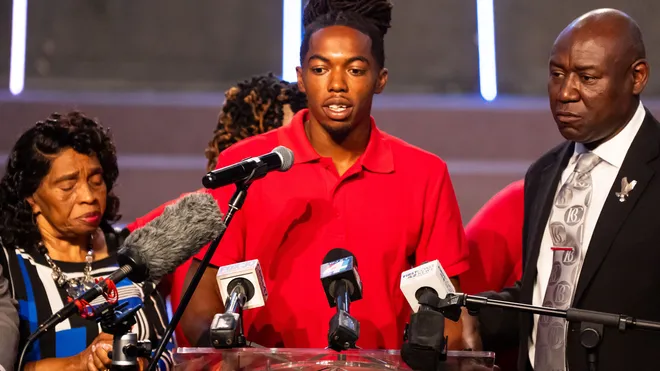- July 24, 2025
William McNeil Jr. Files Charges for Excessive Use of Force During Traffic Stop in Jacksonville

College student William McNeil Jr., 22, accompanied by renowned civil rights attorneys Ben Crump and Harry Daniels, addressed the media after a video of a February 19 traffic stop went viral. The footage shows officers from the Jacksonville Sheriff’s Office smashing the window of his vehicle, striking him multiple times, and dragging him out of the car—even though he was seated with his hands up and showing no resistance.
At the press conference, McNeil stated:
“I just wanted to know why I was being stopped and why I had to get out of the car. I was scared, but I knew I hadn’t done anything wrong.”
*Video contains graphic material which may be disturbing to some*
@fox4newsdallasfortworth Newly released footage shows the controversial traffic stop arrest of a 22-year-old man on February 19, in Jacksonville, Florida. Footage filmed by William McNeil Jr and released by his lawyer shows McNeil Jr discussing with an officer from the Jacksonville Sheriff’s Office (JSO) before being brutally arrested. McNeil Jr’s attorney told News4JAX that he sustained injuries including a chipped tooth and a concussion in the arrest, and that he had to get stitches and was suffering short-term memory loss following the incident. McNeil Jr was charged with resisting an officer without violence, driving while his license was suspended, driving without headlights in inclement weather, possession of more than 20 grams of marijuana, and possession of drug paraphernalia with intent to use. The 22-year-old was sentenced to two days in jail, which was already served by the time of his arraignment, according to News4JAX. Harry Daniels, a federal civil rights attorney representing McNeil Jr, said that the arrest was the “latest in a long line of excessive force incidents involving the JSO.”
According to the police report, McNeil was pulled over for driving without headlights and not wearing a seatbelt. He was charged with nonviolent resistance and driving with a suspended license. After a struggle, officers recovered a large blade from the floor of the car and found marijuana. However, several minor violations were dismissed, and McNeil was sentenced to two days in jail for resisting arrest and driving without a valid license.
The physical consequences for McNeil were severe: he suffered a concussion, a chipped tooth that cut his lip, multiple stitches, and temporary memory loss.
Attorneys Crump and Daniels described the incident as a clear case of police brutality and demanded the release of all video recordings, including body camera footage, and called for administrative penalties against the officers involved.
In response, Sheriff T.K. Waters argued that the video does not provide a full perspective of the incident and warned against hasty conclusions. He confirmed an internal investigation has been launched. Meanwhile, the State Attorney’s Office determined there was no criminal misconduct by the officers, though one officer has been suspended pending administrative review.
📌 Key Facts
-
Viral video: Posted on July 20, shows an officer breaking the car window and punching McNeil without apparent provocation.
-
Victim: A biology student at Livingstone College, McNeil’s case has sparked public awareness around civil rights.
-
Injuries: Concussion, cut lip, broken tooth, multiple stitches, and partial memory loss.
-
Institutional response: Internal police review ongoing; prosecutor found no crime committed, but lead officer temporarily removed.
-
Demands: Crump and Daniels are calling for full transparency and disciplinary actions, citing a historical pattern of racial violence during traffic stops.
🎯 Call to Action
William McNeil Jr. and his legal team urge both the public and local authorities not to let this case become just another viral moment. Instead, they are calling for real reform in traffic stop protocols—particularly in communities of color.

